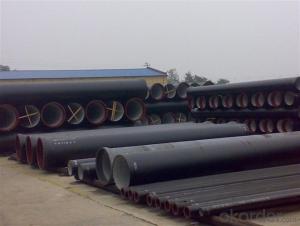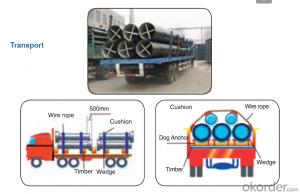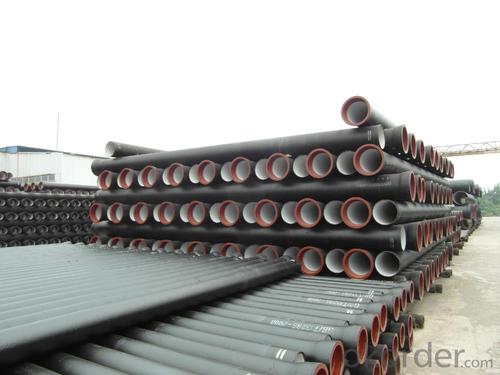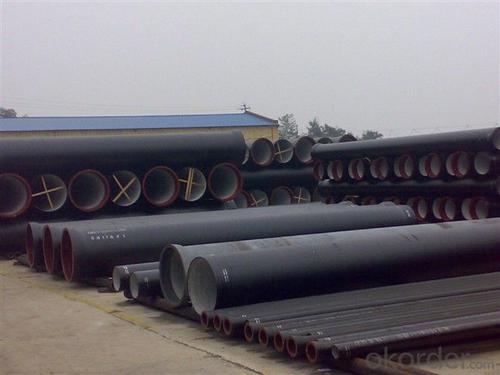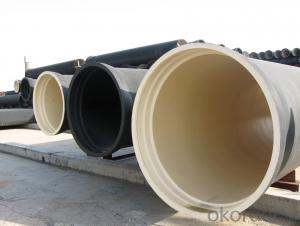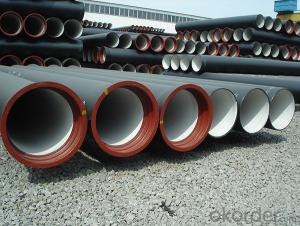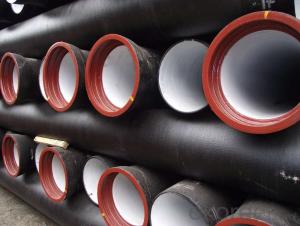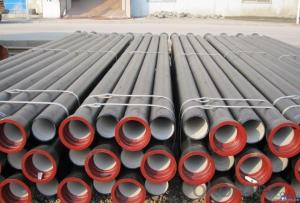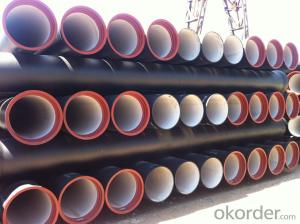Duct Iron Pipe DI Pipe ISO 2531 DN 80-2000mm K12
- Loading Port:
- Tianjin
- Payment Terms:
- TT OR LC
- Min Order Qty:
- 100 m
- Supply Capability:
- 100000 m/month
OKorder Service Pledge
OKorder Financial Service
You Might Also Like
Specification:
1. size : DN80-DN2000 available with PN16 or PN10 or PN25 flanges
2.Standard : ISO2531/EN545/EN598/AWWA standard
3. WRAS Potable Water FBE Internal Lining
4.Material : Ductile iron
5.Technical: Casting
6. Type: Socket / flange PN10 / PN16 / PN25
7. Length=6m, 5.8m
8. Coating: Fusion bonded epoxy to 300 microns Dry Film Thickness
Portland cement lining internally and zinc-rich paint with not less than 70 microns bitumen externally
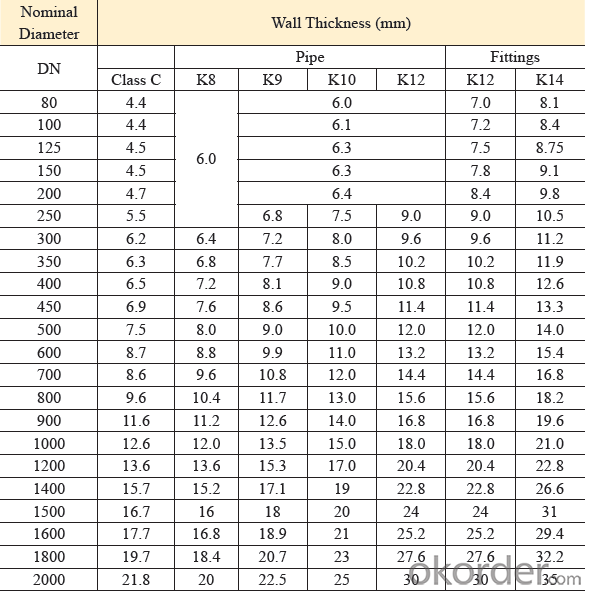
Quality:
ISO 2531 or EN 545 Standard K9 Class, K12 Class
1. ISO 9001 Certificate
2. ISO 2531 & EN 545 Certificate
3. WRAS Potable Water Certificate for FBE Internal Lining
4. WRAS EPDM Rubber Gasket or NBR Rubber Gasket
5. DN80mm - DN2000mm
6. Black Bitumen or Blue FBE / Epoxy Coating
7. Lengh = 6m or cut into 5.6m, 5.7m, 5.8m
8. Client's Brand Customization Allowable
9. Container or Bulk Loading / Shipping
10.Delivery within one Month or According to Client's Order Quantity
11. Support Client or The Third Party Inspection before Shipment
Standard Lining and Coating:
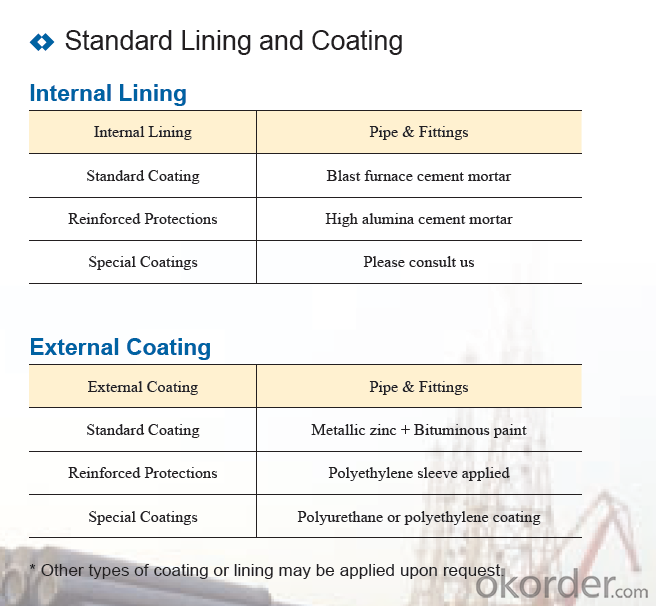
Transport:
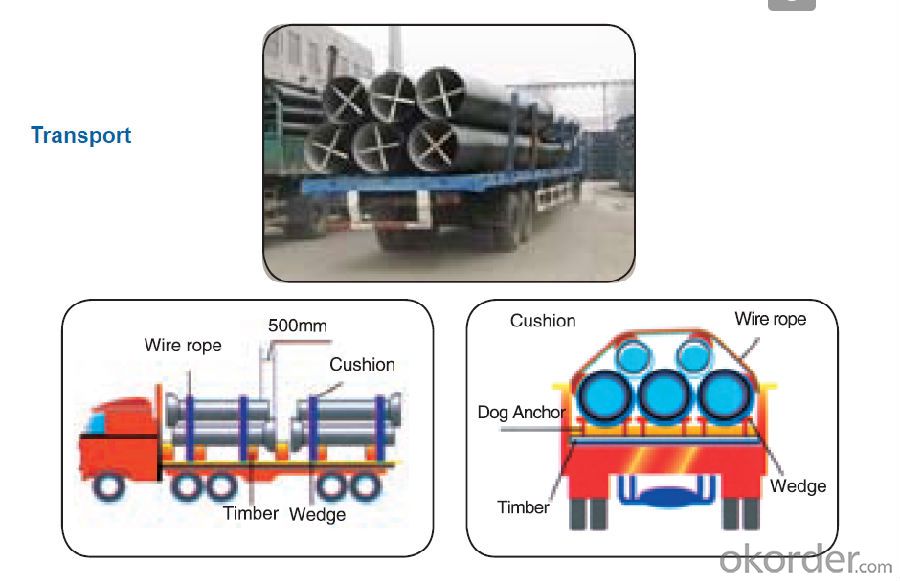
- Q: What are the different types of coatings available for ductile iron pipe?
- There are several different types of coatings available for ductile iron pipe, each with unique properties and advantages. 1. Cement Mortar Coating: This is a commonly used coating for ductile iron pipe. It involves applying a layer of cement mortar to the interior and exterior surfaces of the pipe. This coating provides protection against corrosion and abrasion, as well as improving the hydraulic efficiency of the pipe. 2. Polyethylene Encasement: Another popular coating for ductile iron pipe is polyethylene encasement. This involves wrapping the pipe with a layer of polyethylene material. This coating provides excellent corrosion resistance and is particularly effective in protecting against soil and water contaminants. 3. Fusion-Bonded Epoxy (FBE) Coating: FBE coating involves applying a layer of epoxy powder to the pipe surface, which is then heated to create a strong bond. This coating provides excellent corrosion resistance and is commonly used in aggressive environments such as wastewater treatment plants and chemical processing facilities. 4. Zinc Coating: Zinc coating, also known as galvanization, involves applying a layer of zinc to the surface of the ductile iron pipe. This coating provides excellent corrosion resistance and is often used in outdoor applications where the pipe is exposed to moisture and humidity. 5. Bituminous Coating: Bituminous coating is a black, tar-like substance that is applied to the surface of the pipe. It provides protection against corrosion and is commonly used in underground applications where the pipe is in contact with soil or water. 6. Polyurethane Coating: Polyurethane coatings provide excellent resistance to abrasion, impact, and chemical corrosion. They are often used in aggressive environments such as oil and gas pipelines. These are just a few examples of the different types of coatings available for ductile iron pipe. The choice of coating depends on factors such as the intended application, environmental conditions, and the level of corrosion protection required. It is important to consult with industry experts and adhere to relevant standards and specifications when selecting a coating for ductile iron pipe.
- Q: Can ductile iron pipes be used for seawater intake systems?
- Yes, ductile iron pipes can be used for seawater intake systems. Ductile iron is a type of cast iron that is known for its high strength, durability, and resistance to corrosion. These properties make it well-suited for various applications, including seawater intake systems. Seawater is highly corrosive due to its high salt content, and regular cast iron pipes may be susceptible to corrosion and damage over time. However, ductile iron pipes have a protective coating that acts as a barrier against corrosion, allowing them to withstand the harsh conditions of seawater. Additionally, ductile iron pipes have a higher tensile strength compared to regular cast iron pipes, making them more resistant to the high pressures and stresses associated with seawater intake systems. Overall, ductile iron pipes are a reliable and cost-effective choice for seawater intake systems.
- Q: What is the purpose of ductile iron pipes?
- The purpose of ductile iron pipes is to provide a strong and durable infrastructure for transporting various fluids, including water, sewage, and industrial materials. Their high tensile strength and flexibility make them ideal for withstanding high-pressure conditions, resisting corrosion, and accommodating ground movements, ensuring efficient and reliable delivery of essential resources.
- Q: What are the common methods for flow control in ductile iron pipes?
- There are several common methods for flow control in ductile iron pipes. One of the most commonly used methods is the installation of valves. Valves can be used to regulate the flow of water or other fluids through the pipes. They can be manually operated or automated, depending on the specific needs of the system. Another method for flow control in ductile iron pipes is the use of flow restrictors or flow limiters. These devices are installed in the pipes to reduce the flow rate and ensure that the system operates within its designed parameters. Flow restrictors can be useful in situations where the flow needs to be controlled to prevent damage or to optimize the efficiency of the system. Flow control can also be achieved through the use of pressure regulators. These devices are installed in the pipes to maintain a specific pressure level within the system. Pressure regulators can help prevent excessive pressure, which can lead to pipe bursts or other damage. They can also help maintain a consistent pressure throughout the system, ensuring that the flow is controlled and predictable. Additionally, flow control can be achieved through the use of flow meters. These devices are installed in the pipes to measure the flow rate of the fluid passing through them. By monitoring the flow rate, operators can adjust valves or other flow control devices to ensure that the flow is within the desired range. Flow meters are particularly useful in applications where accurate flow measurement is crucial, such as in industrial processes or water distribution systems. Overall, the common methods for flow control in ductile iron pipes include the use of valves, flow restrictors, pressure regulators, and flow meters. These methods can be combined or used individually depending on the specific requirements of the system.
- Q: How is ductile iron pipe tested for quality?
- Ductile iron pipe is extensively tested for quality to ensure its performance and reliability in various applications. The testing process involves several steps to assess the physical and mechanical properties of the pipe. One of the primary tests conducted on ductile iron pipe is the hydrostatic pressure test. This test involves subjecting the pipe to fluid pressure higher than its designed operating pressure to determine its ability to withstand internal pressure without leakage or failure. The pipe is filled with water or another suitable fluid, and pressure is gradually increased to the required level. The pipe is inspected for any signs of leakage or deformation during this test. Another crucial test is the tensile strength test, which measures the pipe's ability to resist pulling or stretching forces. A sample of the pipe is pulled until it breaks, and the maximum force applied during the test is recorded. This test helps determine the pipe's ultimate tensile strength, yield strength, and elongation properties. Ductile iron pipe is also tested for its impact resistance through the Charpy test. This test involves striking a notched sample with a swinging pendulum to measure the amount of energy absorbed by the pipe. It helps assess the pipe's ability to withstand sudden impacts or loads without fracturing. Additionally, the pipe undergoes various non-destructive tests, including ultrasonic testing, magnetic particle inspection, and visual inspection. These tests help detect any internal or external defects, cracks, or abnormalities that may affect the pipe's structural integrity. Furthermore, chemical analysis and metallographic examination are performed to evaluate the chemical composition and microstructure of the ductile iron pipe. These tests ensure that the pipe meets the required specifications and standards for its intended application. Overall, the testing process for ductile iron pipe is comprehensive and rigorous, aiming to guarantee its quality, durability, and overall performance in delivering water, wastewater, or other fluids safely and efficiently.
- Q: Can ductile iron pipes be used for water supply in buildings?
- Ductile iron pipes are indeed a viable option for water supply in buildings. Renowned for their strength, durability, and resistance to corrosion, these pipes are well-suited for a wide range of uses, including water supply systems. With their impressive tensile strength, they can endure high-pressure conditions, making them perfect for delivering water to buildings. Furthermore, ductile iron pipes boast a lengthy lifespan, minimizing the necessity for frequent replacements. They also display excellent flow properties, facilitating efficient water distribution within structures. Consequently, ductile iron pipes are a dependable and frequently selected choice for water supply systems in buildings.
- Q: What is the difference between ductile iron and cast iron pipes?
- Ductile iron and cast iron pipes are both popular materials used in plumbing systems, but they have distinct differences in terms of composition, strength, and flexibility. 1. Composition: Ductile iron pipes are made from ductile iron, which is a type of cast iron that has been treated with trace amounts of magnesium to enhance its flexibility and strength. On the other hand, cast iron pipes are made from regular cast iron, which is more brittle and less malleable. 2. Strength: Ductile iron pipes are significantly stronger than cast iron pipes. Ductile iron has a higher tensile strength, meaning it can withstand higher levels of internal and external pressure. This makes it more suitable for applications where high strength is required, such as water mains or sewer lines. Cast iron pipes, on the other hand, are more prone to cracking or breaking under pressure. 3. Flexibility: Ductile iron pipes have greater flexibility compared to cast iron pipes. This flexibility allows them to withstand ground movement, making them less susceptible to damage or breakage caused by settling or shifting soil. Cast iron pipes, due to their inherent brittleness, are more likely to crack or separate when exposed to ground movement or vibrations. 4. Installation: Ductile iron pipes are typically joined using a mechanical joint or flanged joint, which provides a secure and leak-proof connection. On the other hand, cast iron pipes are usually joined using a bell-and-spigot joint, which relies on gaskets or lead caulking to create a seal. The mechanical joint used in ductile iron pipes offers better resistance to movement and external forces. 5. Cost: Ductile iron pipes are generally more expensive than cast iron pipes. The additional treatment process and higher strength of ductile iron contribute to the increased cost. However, the added durability and longer lifespan of ductile iron pipes can offset the initial investment, as they may require fewer repairs or replacements over time. In summary, the main differences between ductile iron and cast iron pipes lie in their composition, strength, flexibility, installation methods, and cost. Ductile iron pipes offer superior strength and flexibility, making them more suitable for demanding applications, while cast iron pipes are more brittle and prone to breakage. Ultimately, the choice between the two depends on the specific requirements of the plumbing system and the available budget.
- Q: What is the typical weight of ductile iron pipes?
- The weight of ductile iron pipes can differ according to their size and thickness. Nonetheless, as a broad reference, smaller diameter pipes typically weigh around 1 pound per foot, while larger diameter pipes can weigh several hundred pounds per foot. The weight of ductile iron pipes is influenced by factors like the dimensions of the pipes, the thickness of their walls, and the particular requirements of the intended use. It is essential to acknowledge that these weights are approximate and subject to variation depending on the manufacturer and product specifications.
- Q: Can ductile iron pipe be used for stormwater management systems?
- Ductile iron pipe is indeed suitable for stormwater management systems. It finds extensive use in diverse applications, such as stormwater drainage systems. Its exceptional attributes encompass robustness, longevity, and resistance against corrosion, rendering it highly capable of enduring the challenging conditions inherent in stormwater management. Furthermore, the installation and maintenance of ductile iron pipe are effortless, thus making it a cost-efficient selection for stormwater management systems. In summary, ductile iron pipe emerges as a dependable and fitting alternative for the construction of stormwater management systems.
- Q: Can ductile iron pipes be used in coastal or marine environments?
- Yes, ductile iron pipes can be used in coastal or marine environments. Ductile iron has high corrosion resistance and can withstand the harsh conditions found in these areas, including exposure to saltwater and moisture. Additionally, its strength and durability make it suitable for withstanding the impacts of waves and tides. Proper coatings and cathodic protection can further enhance the longevity of ductile iron pipes in coastal or marine environments.
Send your message to us
Duct Iron Pipe DI Pipe ISO 2531 DN 80-2000mm K12
- Loading Port:
- Tianjin
- Payment Terms:
- TT OR LC
- Min Order Qty:
- 100 m
- Supply Capability:
- 100000 m/month
OKorder Service Pledge
OKorder Financial Service
Similar products
Hot products
Hot Searches
Related keywords

